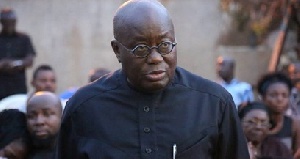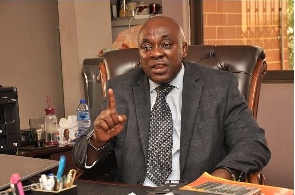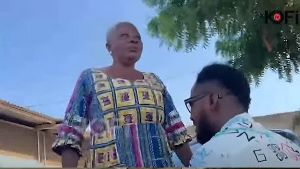By: Nicholas Issaka Gbana
Jorge Mario Bergoglio became Pope Francis on March 13, 2013, when he was named the 266th Pope of the Roman Catholic Church which has a global membership of over 1.2 billion.
After less than a year in office, Fortune magazine named him the world's greatest leader in November 2013. The TIME magazine named him “Person of the Year for 2013” in December 2013. The Pope had demonstrated “rare leadership in multiple areas”.
The Holy Papa is a radical but not the fiery and loud type. He began challenging the status quo within the Church the very day he ascended the papal throne.
I will give six examples of the truly unprecedented things Pope Francis did within a year of assuming office.
His Outdooring as Pope
He dispensed with tradition when he first appeared as Pope on the Vatican balcony on the night of March 13, 2013, after the long awaited announcement "habemus papam" (we have a pope).
Rather than bless the crowd in St. Peter’s square first, he asked them to pray for him. He refused to wear the papal cape upon his election and chose silver instead of gold for the papal ring. He also refused to use a platform on the balcony to elevate himself above the cardinals standing with him as he was introduced to the world as Pope Francis.
His Choice of Name
He is the first pope to choose the name Francis. It is in honour of St. Francis of Assisi one of the most revered figures in religion who was never ordained into the Catholic priesthood but became a saint on account of his works.
Known in Italian as Il Poverello (the Poor One), St Francis was once a soldier and the son of a wealthy merchant in the 13th century. When he reached the age of 25 he dumped his privileged life and expensive clothing and chose to wear sackcloth and minister to the poor for the rest of his life.
Pope Francis had said the Church must strip itself of all "vanity, arrogance and pride" and humbly serve the poorest in society.
His Choice of People for Key Positions
In September 2013, he chose an effective Vatican diplomat, Archbishop Pietro Parolin, as his Secretary of State. The job is the de-facto Prime Minister and the second most powerful position in the church. The Archbishop (now a Cardinal) had served in Nigeria, Venezuela and Mexico. He was considered among the best and brightest within the Vatican bureaucracy and was known to be the prime mover in the Vatican’s improved relationship with communist China and Vietnam.
Before his appointment, Archbishop Parolin had said in an interview with a Venezuelan newspaper that the tradition of priestly celibacy is not dogma, or a law of divine origin, and is, therefore, open to discussion. The previous Secretary of State, Cardinal Bertone, who was appointed by Pope Benedict was associated with controversy and breakdowns in governance at the Vatican. He was widely criticized over the “Vatileaks" scandals in 2012 that revealed corruption and infighting at the Vatican.
He Was Bold in Confronting Challenges
Pope Francis took office in the midst of the child abuse scandals by priests, and allegations of corruption and money laundering at the Vatican Bank (or Institute of Religious Works). The child abuse issue had seriously damaged the reputation of the church around the world and led to some dioceses especially in the United States paying billions of dollars in legal fees and settlements.
He confronted both problems head on
The Pope named an eight-member commission to advise him on sex abuse policy. The surprise was that half of the members of the commission were women including one who was assaulted by a priest as a child. This signaled a new openness by the Pope to reach beyond church officials to deal with the child abuse problem.
He shook up the Vatican Bank replacing four out of the five cardinals on its supervisory board. He halted the controversial practice of wealthy donors spending heavily to win special treatment for sainthood candidates. He also appointed a special commission to investigate allegations of corruption and money-laundering at the bank.
For the first time in its 125 year history, the Vatican Bank publicly published its annual report in October 2013 to become more financially transparent.
In November 2013 the Pope commissioned a worldwide survey to find out what Catholics really thought about its teachings on marriage and family life. Some of the survey questions sought opinions on previously considered taboo subjects like cohabiting with a member of the opposite sex outside marriage, single parent families, inter-religious unions and divorce.
He Maintained Simplicity and Shunned the ‘High Life”
Pope Francis chose to live in a modest two-room residence in the Vatican instead of the grand papal apartment on the top floor of the Vatican's Apostolic Palace.
As Archbishop of Buenos Aires in Argentina, he refused to move into the Bishop's Palace. He preferred more modest accommodation and often cooked his own meals.
The Pope does not use a papal limousine. In Italy, he has been known to use a Ford Focus saloon car or 20-year-old Fiat for his official visits. On his first official assignment the day after his enthronement he ditched a chauffeur-driven limousine and joined the Cardinals on a bus. Indeed in his previous life as a Cardinal and Archbishop of Buenos Aires, he was known to be a regular user of public transport. Some have advocated that he should be named the patron saint for public transport.
When he visited Brazil in November 2013 he refused to use an armoured Popemobile despite requests from Brazilian officials. He chose to be driven into Rio de Janeiro, the Brazilian capital, in a modest Fiat saloon car with the windows wound down. In the city centre he switched to an open-air Popemobile, waving at the tens of thousands who lined the streets to welcome him.
The popemobile has been around since 1930 when the German car manufacturer Daimler-Benz gave Pope Pius XI a custom made vehicle for his use. The one used by Pope Francis’s predecessor, Pope Benedict XVI, was a modified bulletproof Mercedes Benz SUV with a special glass-enclosed room. His Stance on Corruption
In a November 2013 sermon, the Pope described people involved in corrupt practices as “whitewashed tombs…they appear beautiful from the outside, but inside they are full of dead bones and putrefaction.”
Quoting from the Gospel of St Luke in the New Testament he suggested that the corrupt should be tied to a rock and thrown into the sea.
He repeatedly called for a more austere and less-materialistic Church. In October 2013 he suspended a German bishop who built a €31 million residence. The German media had nicknamed him “the luxury bishop”. He was known to have visited the poor in India whilst travelling first class.
Age is only a Number
Pope Francis was 76 years old when he ascended the papal throne. He confirms the saying - age is only a number.
Old people can be good and effective leaders.
The writer, a Development Worker and Management Consultant, can be contacted via email at ?nissakagbana@gmail.com













